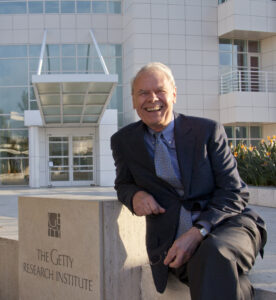“As a scholar, one’s career typically revolves around teaching, research, and scholarship. Once in a while, a scholar is lucky enough to have a hand in building something. I’d like to think I have helped build a thing or two in my career.”
Such were the words of renowned art historian Thomas Gaehtgens upon wrapping up his oral history at the Getty Research Institute (GRI) in the fall of 2017. That the words held an element of retirement was no coincidence. Gaehtgens had already enjoyed a long and successful academic career before assuming the directorship of the GRI in 2007, a position from which he would officially retire in the spring of 2018. True to form, Gaehtgens met retirement with the same productive stride that had underpinned his work throughout the previous five decades. Thus, after a fruitful delay, the Oral History Center and Getty Trust are pleased to announce the release of Thomas Gaehtgens: Fifty Years of Scholarship and Innovation in Art History, from the Free University in Berlin to the Getty Research Center.

Getty Research Center
For many in the academic and art world of Europe, Gaehtgens needs no introduction. Born in Leipzig, Germany, he completed his PhD in art history at the University of Bonn in 1966, and over the next forty years held professorships at the University of Göttingen and the Free University of Berlin. He is the author of nearly forty publications on French and German art, covering a wide range of topics and artists from the eighteenth to the twentieth century.
Scholarship aside, Gaehtgens also made a mark through his globalist approach to art, fostering relationships that bridged the divides between universities and museums, as well as those between nations. He organized the first major exhibition of American eighteenth and nineteenth century paintings in Germany, expanded the art history curriculum in Berlin to include non-Western areas, and founded the German Center for Art History in Paris. These efforts made him a natural fit for president of the Comité International d’Histoire de l’Art (CIHA), where he advanced initiatives such as the translation of art history literature and broadening the field of art history through international conferences.
Gaehtgens brought this same spirit of inclusivity and innovation to the Getty Research Institute. In many respects, he helped usher the GRI into the twenty-first century by launching a number of programs that not only brought modern technology to the study of art, but also two principles close to Gaehtgens’ heart: international collaboration and equal access for all. The creation of the Getty Provenance Index proved a case in point. In partnership with a host of European institutions, the Index provided a one-stop, digital archive for researchers to trace the ownership of various art pieces over the centuries. Here, for the first time, the records of British, French, Dutch, German, Italian, and Spanish inventories stood at the fingertips of researchers. These same principles of technology, cooperation, and equitable access also underpinned the GRI’s creation of the Getty Research Portal, a free online platform providing access to an extensive collection of digitized art history texts, rare books, and related literature from around the world. Other important achievements of Gaehtgens’ directorship included the Getty Research Journal, a more internationally represented Getty Scholars program, and the Getty’s California-focused art exhibitions, Pacific Standard Time.
Thomas Gaehtgens retired from the Getty Research Institute in 2018, officially ending an art history career that spanned over fifty years. Fittingly, his decades of work have been recognized around the world. He holds honorary doctorates from London’s Courtauld Institute of Art and Paris-Sorbonne University. In 2009, he received the Grand Prix de la Francophonie by the Académie française, an honor bestowed by the Canadian Government to those who contribute to the development of the French language throughout the world. And in 2011, Gaehtgens was elected a fellow of the American Academy of Arts and Sciences. Such honors highlight the indelible mark he left on the global field of art history, one still seen today from the German Center for Art History in Paris to the now-famed digital programs of the Getty Research Institute. Indeed, Thomas Gaehtgens was not just an influential teacher and productive scholar, but also an innovative art historian who helped build a thing or two.
You can access the full oral history transcript of Thomas Gaehtgens here. See also other oral histories from the Getty Trust Oral History Project.
About the Oral History Center
The Oral History Center of The Bancroft Library has interviews on just about every topic imaginable. You can find the interview mentioned here and all our oral histories from the search feature on our home page. Search by name, keyword, and several other criteria. We preserve voices of people from all walks of life, with varying political perspectives, national origins, and ethnic backgrounds. We are committed to open access and our oral histories and interpretive materials are available online at no cost to scholars and the public.
Sign up for our monthly newsletter featuring think pieces, new releases, podcasts, Q&As, and everything oral history. Access the most recent articles from our home page or go straight to our blog home.